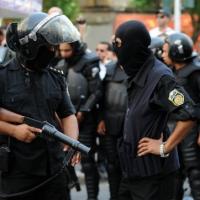
A daily occurence
The practices of the Tunisian police have been a daily topic in Tunisia, a topic recently exported across borders due to the recent story of the rape, in September 2012, of a woman by two police officers in service. This woman now finds herself, along with her partner, accused by a judge of ‘public indecency’, while the police are the ones protected by the Minister of Interior. The victim has become the culprit.
This behaviour corresponds to the logic of the ‘awrah’, a patriarchal law that the ruling party Ennahda seeks to impose, where the woman, by her exposure, her physical appearance and clothes, ‘provokes’ men and is hence the source of the ‘fitna’ (a word that means both seduction and sedition). This supposedly inspires men with the idea of rape. If a woman is raped, it is because she has put herself in a situation to be raped. This is the idea now practically pursued by police officers, echoed in this case by the justice department and by the ministers concerned.
But abuse and violence against women by police officers in reality affects all Tunisian women. It is what happened, for example, to my mother recently, who was violently attacked during her night shift as a nursing aide at the Rabta hospital, in Tunis, by two officers of the National Guard, trying to enter by force into the cardiology service, normally forbidden to the public. After having also used violence against a nurse and left the place, the two officers were arrested by the doctor on duty and put in custody at the Bab Souikra police station.
The hospital staff filed a complaint, and a medical certificate was drawn up following their injuries. But after the departure of the hospital team, the two police officers were released without being challenged, let alone arrested. They were only arrested the next day, following a strike by all the Cardiology Department staff, and the subsequent intervention of the Ministry of Health. Clear evidence, once again, that the police and judicial procedures are not respected, and that the law is not the same for everyone.
Every day, the same stories occur and every day we see the police abusing their rights, involved in corruption, using violence, not only protecting the privileges and interests of the rich, but behaving themselves like the worst criminals in this country. Indeed, anecdotes like those mentioned above are symptomatic of the methods at the heart of the whole Tunisian state and of the police administration in its daily practises, including at the highest levels.
These two cases, among many others, testify to the absence of genuine democracy in post-revolutionary Tunisia. Government administration has not changed from the days of Ben Ali. The same abuses and crimes take place every day and the first victims are always the same: workers, youth, women, the popular masses in the broad sense.
In a context where Tunisia is once again on the verge of new explosions, with general strikes in Sidi Bouzid and Kasserine, and demonstrations and strikes in several cities and towns across the country, it is time once again to rally behind collective action, echoing our partners, the working class and the youth, struggling against this system all around the world.

Be the first to comment